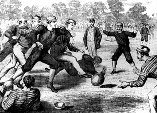
“Remember the Sabbath day, to keep it holy.” Exodus 20:8
“For freedom Christ has set us free; stand firm therefore, and do not submit again to a yoke of slavery.” Galatians 5:1
In 1618, King James I of England issued the Declaration of Sports which enumerated which sports may be lawfully played on Sunday. Football was not one of them, but then again American football had not yet been invented. In any case, this declaration ruffled Puritan ministers of the time, who were committed to more strict “Sabbath” observance (recognizing Sunday as the “Christian Sabbath”). This debate blazed for decades, with the Declaration publicly burned by the Parliament in 1643.
Today, American Christians aren’t too worked up about sporting on the Sabbath. Nevertheless, there is an underlying issue that we must each examine: How exactly do we understand Christian freedom—that liberty we enjoy as sons and daughters of God through Jesus Christ? What does it mean to be freed from the rigor of the Old Testament law, and how does this relate in particular to the Ten Commandments (“Remember the Sabbath Day to keep it holy” is number four)?
Based on Galatians 4, I look at Christian freedom this way: You might tell your 5 year old child, “Don’t touch the stove!” But when he is grown, you allow him full access to the stove. You don’t give him extended freedom so he can burn his hand on the stove or stick his head in the oven, but because you expect him to have the wisdom to use it wisely. Similarly, God our Father gave us rules to follow in the Old Testament when we were “young.” Now that we are “grown,” we are expected to possess a greater maturity so that we can see behind the precise rules to their purpose. We are not expected to abuse our freedom (sticking our head in the oven) but take advantage of it (heat up our own frozen pizza).
How does this relate, then, to the Fourth Commandment in particular? God laid down many rules for Sabbath observance in the Law and the Prophets. For example, you could not pick up sticks on the Sabbath. Now that Jesus has come and the Scriptures are complete, we are expected to see the manifold wisdom of the Fourth Commandment and apply it accordingly. As spiritual grown ups, we should understand our needs for communion with God, fellowship with other believers, and true rest. We should also understand our responsibilities—to Christ’s church and to our families, friends, and neighbors. As we manage these needs and responsibilities, however, we are given freedom. To invite friends over for the Super Bowl, toss around a football with our son, or pick up sticks in the yard is our call; the Law is no longer acting as a referee.
But notice something: We are not to trample on God’s law like rebellious teenagers, but to honor God’s law like responsible young adults. Practically speaking, this means that we really think about how we use our time (or money, or whatever), and think about how we might use our freedom to honor our heavenly Father. God is not so concerned about whether we watch the Super Bowl or pick up sticks, but about the motivation behind these actions.
The Puritans were sometimes puritanical. However, their motivation was to honor God in all areas of life—and this is something we Americans need to learn a lot more about.


1 comment:
This post deserves further discussion and nuance. But it is clearly long enough! But I at least wanted to provide the portion of Galatians 4 to which I referred:
"I mean that the heir, as long as he is a child, is no different from a slave, though he is the owner of everything, but he is under guardians and managers until the date set by his father. In the same way we also, when we were children, were enslaved to the elementary principles of the world. But when the fullness of time had come, God sent forth his Son, born of woman, born under the law, to redeem those who were under the law, so that we might receive adoption as sons. And because you are sons, God has sent the Spirit of his Son into our hearts, crying, 'Abba! Father!' So you are no longer a slave, but a son, and if a son, then an heir through God." (Galatians 4:1-7)
Post a Comment